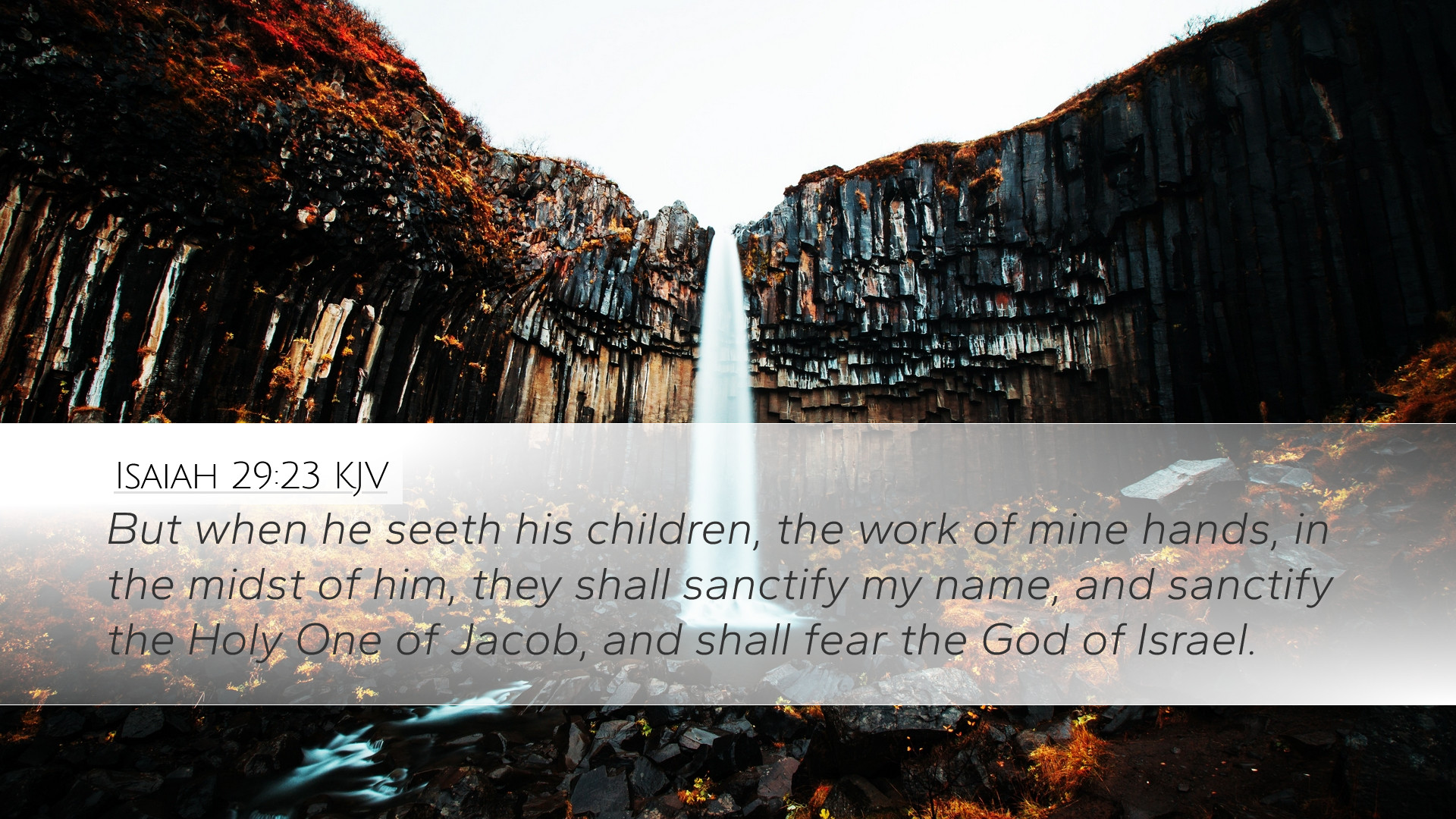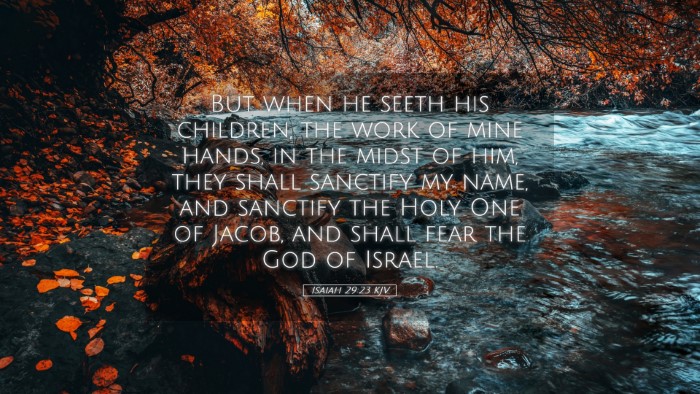Commentary on Isaiah 29:23
Bible Verse: Isaiah 29:23 - "But when he seeth his children, the work of mine hands, in the midst of him, they shall sanctify my name, and sanctify the Holy One of Jacob, and shall fear the God of Israel."
Introduction
This verse serves as a profound reminder of God's promise to His people and His ongoing relationship with them. It represents not only a call to reverence but also a vision of redemption and restoration. Commentaries from Matthew Henry, Albert Barnes, and Adam Clarke offer rich insights into the theological and practical implications of these words.
Exegesis of the Verse
The structure of Isaiah 29:23 reveals a transformation in the lives of the children of Israel. The phrase "the work of mine hands" refers to God's creative and redemptive work, emphasizing that the Israelites are formed by God's purpose. The sanctification of God's name signifies a recognition of His holiness amidst His people.
Matthew Henry's Commentary
Matthew Henry highlights the necessity of recognizing the works of God in our lives. He points out that when the people of Israel "see their children," there is both a literal and a spiritual significance. It signifies the fruitfulness that God desires from His people, contrasting their current state of rebellion.
- God's Ownership: Henry emphasizes that children are a gift from God, and recognizing them as a 'work of God's hands' illustrates the relationship of creator to creation.
- Sanctification: The process of sanctifying God's name involves our commitment to live in such a way that honors Him, illustrating the impact of a life transformed.
Albert Barnes' Commentary
Albert Barnes offers a deeper exploration of the term "sanctify." He explains that to sanctify God's name is to acknowledge His greatness and majesty. The verse embodies a future hope wherein the people will recognize their identity as God's children.
- Future Restoration: Barnes notes that this verse points to a time of restoration when God's people will turn back to Him, thus fulfilling their role as worshippers of Yahweh.
- Fear of the Lord: The reverence suggested by "shall fear the God of Israel" conveys an appropriate response to understanding God’s holiness, leading to true worship.
Adam Clarke's Commentary
Adam Clarke reflects on the implications of the Holy One of Jacob. He discusses the covenantal relationship represented here, emphasizing that God's holiness is foundational to Israel's understanding of their destiny.
- Covenant Relationship: Clarke points out that God's identification as the "Holy One of Jacob" goes beyond mere acknowledgment, urging the people to embody the values associated with that title.
- Transformative Power: Through an encounter with God, the people are called to fear Him genuinely, leading to communal and individual transformation.
Theological Implications
The verse is rich with theological implications regarding God’s sovereignty and grace. For pastors and theologians, it raises questions about how one can recognize the work of God in their own lives and communities.
- Understanding Divine Work: This reflection encourages believers to see themselves as part of God’s creative narrative and an outworking of His purposes.
- Importance of Naming God: To sanctify God’s name is to allow it to shape one’s identity, which influences collective worship and communal ethics.
Practical Applications
Beyond theological discourse, insights drawn from this verse provide a pathway for practical living and pastoral care. Here are some applications:
- Encouraging Faith Communities: Pastors can encourage congregations to recognize and celebrate the work of God in their lives, fostering environments that honor God’s intentions.
- Fostering Awe and Reverence: In worship settings, pastors may structure services that cultivate a deep sense of awe towards God, leading congregants to 'fear' Him appropriately.
- Nurturing Children in Faith: This verse stresses the value of the next generation, prompting leaders to invest in youth and children, teaching them about God’s holiness and His works.
Conclusion
Isaiah 29:23 encapsulates essential themes of redemption, sanctification, and reverence towards God. The commentaries highlight that the recognition of God's work in our lives is crucial for true transformation. As believers reflect on their identity as the "work of His hands," they can participate in a community that genuinely honors and reveres the Holy One of Jacob.


